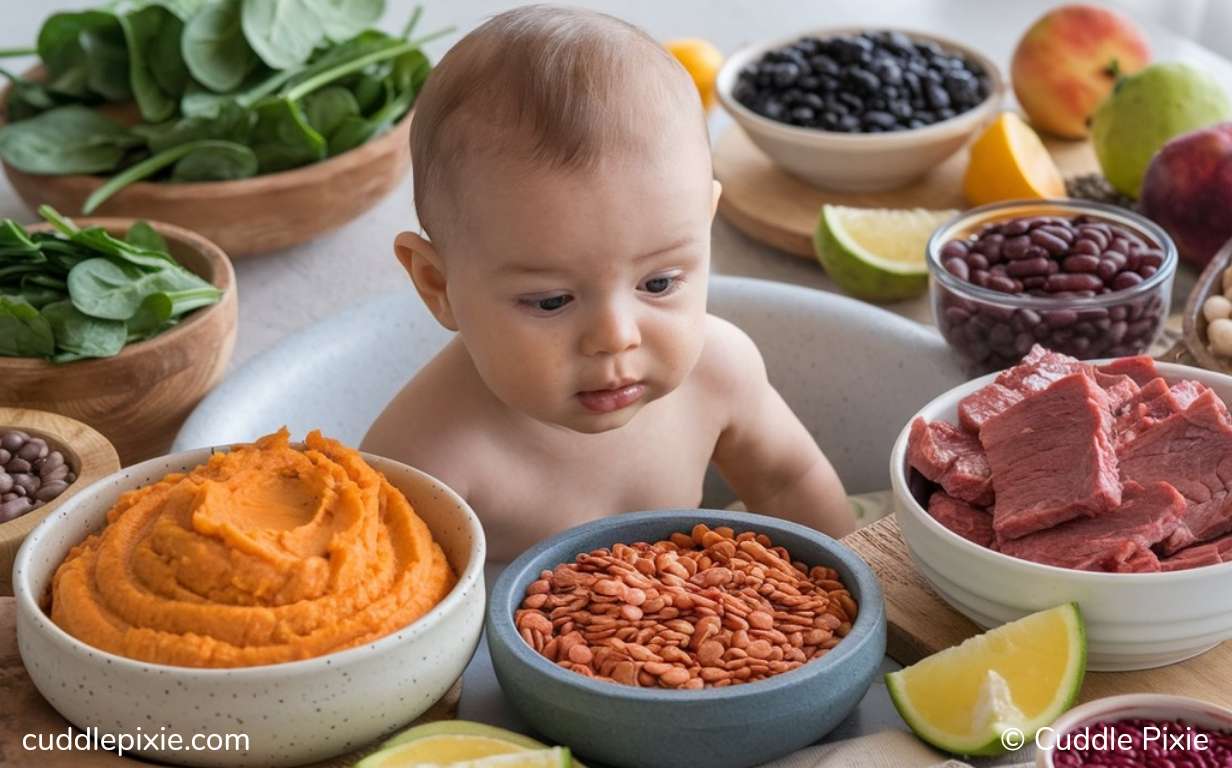Iron is an essential nutrient that plays a critical role in your baby’s growth and development. It supports cognitive function, helps produce red blood cells, and strengthens the immune system. Babies with iron deficiency can experience developmental delays, poor appetite, and increased susceptibility to infections.
This guide will help you understand the causes of iron deficiency in babies, how much iron they need, and most importantly, provide a comprehensive list of iron-rich foods to include in their diet. By focusing on both animal-based (heme iron) and plant-based (non-heme iron) sources, you’ll learn how to prevent iron deficiency and keep your baby healthy and thriving.
In This Article
What is Iron Deficiency in Babies?
Iron deficiency occurs when your baby does not have enough iron to produce the hemoglobin necessary for carrying oxygen in red blood cells. Since oxygen is critical to every cell in the body, low iron levels can affect many aspects of a baby’s health and development.
Common Causes of Iron Deficiency in Babies
- Premature Birth: Babies born before 37 weeks often miss out on the iron stores built up during the final weeks of pregnancy. This makes them more prone to iron deficiency during infancy.
- Low Iron Intake: After 6 months, breast milk alone may not provide enough iron to meet a baby’s growing needs. Introducing iron-rich foods at this stage is essential to prevent iron deficiency.
- Rapid Growth Spurts: Babies grow quickly, and their iron requirements increase with age. Without a sufficient intake of iron-rich foods, their body may struggle to keep up with the demand.
- Inadequate Iron Absorption: Babies who consume too much calcium (such as from dairy products) or foods that inhibit iron absorption may not absorb enough iron, even if they are eating iron-rich foods.
Symptoms of Iron Deficiency in Babies
- Pale skin
- Fatigue or irritability
- Slow weight gain or poor appetite
- Cold hands and feet
- Frequent infections
- Unusual tiredness or weakness
If you notice any of these symptoms, consult a pediatrician, who may recommend a blood test to check your baby’s iron levels. Early detection is key to preventing complications related to iron deficiency.
How Much Iron Does Your Baby Need?
The amount of iron a baby needs changes as they grow. The recommended daily intake is:
- 0-6 months: 0.27 mg/day (usually met through breast milk or formula)
- 7-12 months: 11 mg/day
- 1-3 years: 7 mg/day
By 6 months, babies’ natural iron stores (accumulated from pregnancy) start to deplete. At this stage, it’s crucial to introduce iron-rich foods, as breast milk or formula alone may not meet their growing iron needs.
Best Animal-Based Iron-Rich Foods for Babies (Heme Iron)
Heme iron, which is found in animal products, is more easily absorbed by the body than non-heme iron from plant-based sources. Introducing a variety of heme iron sources ensures your baby receives a sufficient amount of this critical nutrient.
1. Lean Red Meat (Beef)
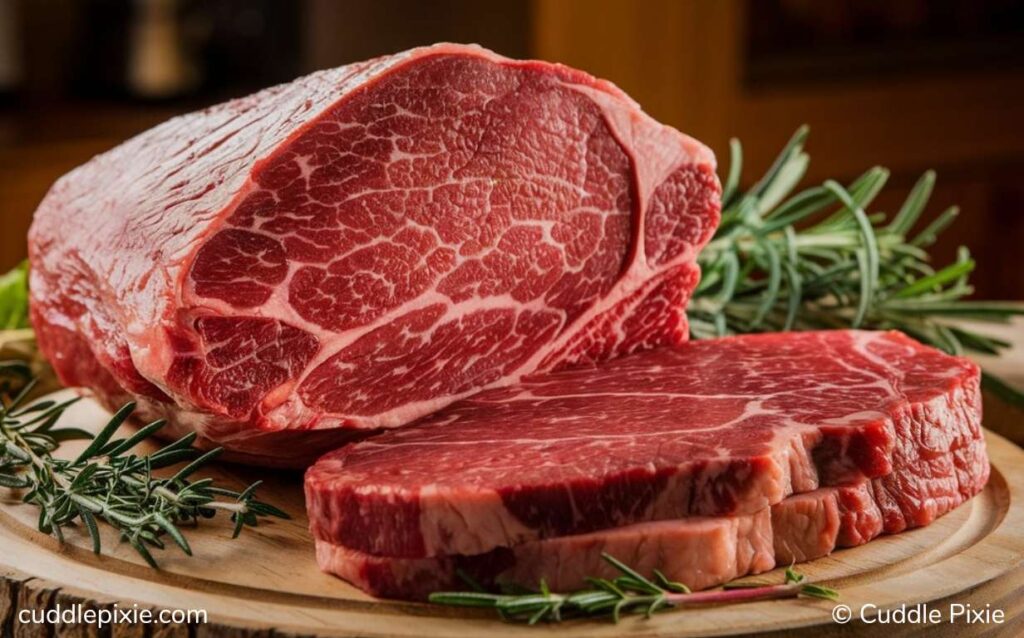
Beef is one of the best sources of heme iron. It’s rich in protein, which is essential for muscle development, and provides about 2.5 mg of iron per 3-ounce serving.
“Beef provides nearly 25% of a baby’s daily iron needs per serving, and its high bioavailability makes it an ideal choice for preventing iron deficiency.” — Renato Fernandes, Clinical Nutritionist
Serving Idea: For babies just starting solids, cook the beef until tender and then puree it with a vegetable like carrots or sweet potatoes. You can also offer finely minced beef as finger food for older babies.
2. Chicken Liver
Chicken liver is a nutritional powerhouse, containing more than the daily recommended iron intake in just one serving. It’s also high in vitamin A, which supports immune health and vision.
“Chicken liver is one of nature’s most potent sources of easily absorbable iron. Just one serving can provide a baby’s entire daily iron needs.” — Dr. Sarah Martinez, PhD, RDN
Serving Idea: To make chicken liver more palatable for babies, puree it with apples or carrots. For older babies, you can serve it finely chopped and mixed into soups or casseroles.
3. Egg Yolks
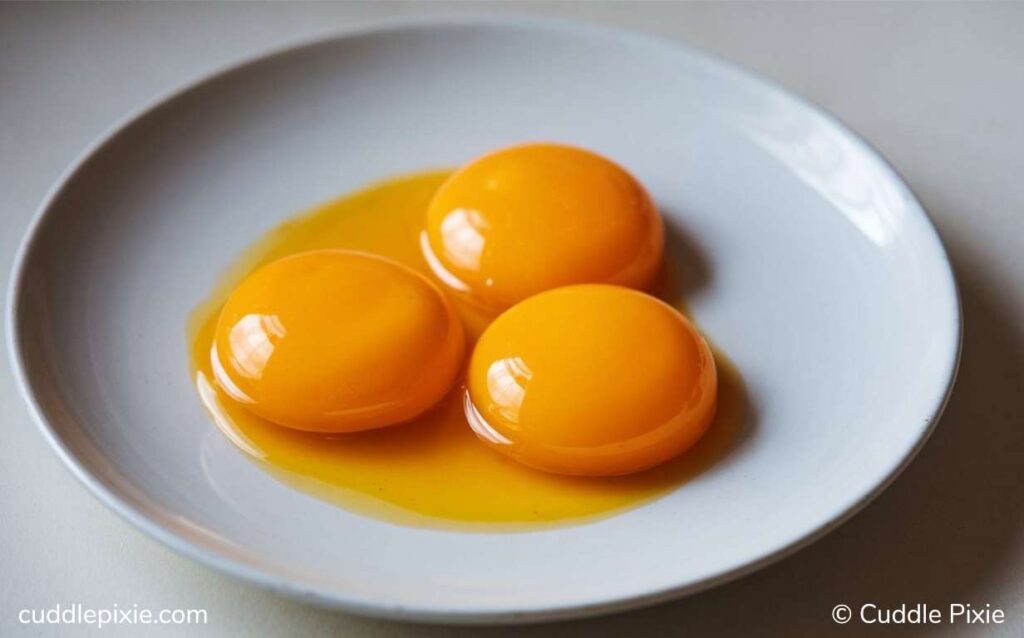
Egg yolks are another excellent source of heme iron, containing about 0.9 mg per egg. They’re also packed with essential fats that support brain development.
“Egg yolks are rich in iron, but since they’re a common allergen, introduce them gradually, watching for any signs of allergic reactions.” — Renato Fernandes, Clinical Nutritionist
Serving Idea: Mash a boiled egg yolk with a little breast milk or formula for a smooth, creamy texture. For older babies, scrambled eggs are a great finger food option.
4. Sardines
Sardines are packed with iron and omega-3 fatty acids, which support brain development. They are one of the few fish that are low in mercury but rich in iron, making them safe for babies.
“Sardines are often overlooked, but they’re a fantastic source of easily absorbable iron and essential nutrients like omega-3s.” — Emily Richards, Certified Pediatric Dietitian
Serving Idea: Mash sardines with avocado for a soft, nutritious spread. You can also blend them into a puree with vegetables like spinach or sweet potatoes.
5. Turkey
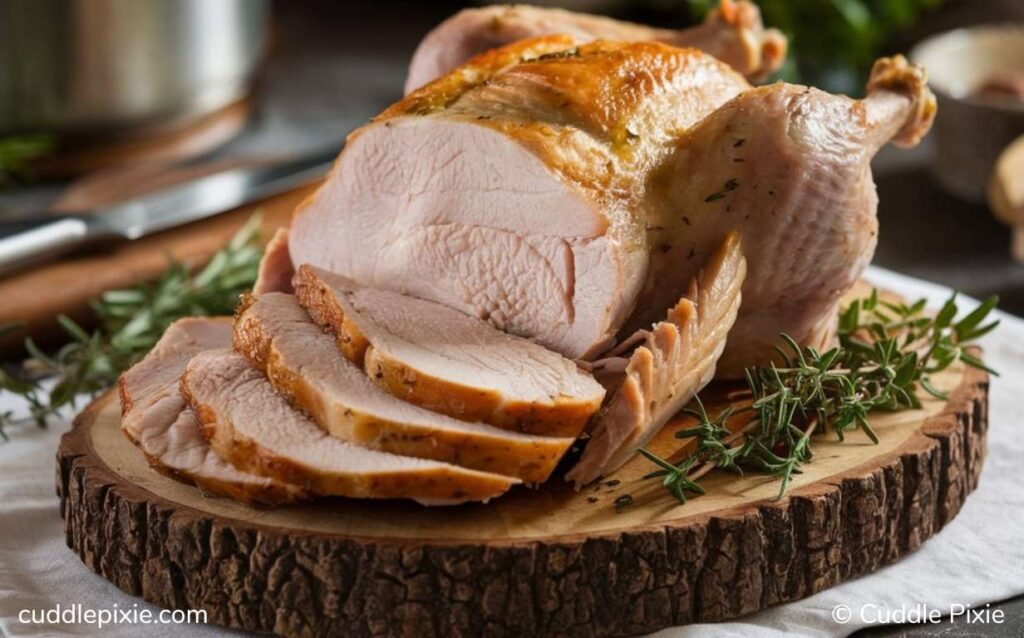
Turkey is a lean source of iron that’s easy to digest and a great option for babies who are starting solids. Ground turkey can be mixed into purees or soups, offering a gentle yet iron-rich meat for babies.
Serving Idea: Cook ground turkey with vegetables like zucchini or peas, and blend for younger babies. For toddlers, try serving small, soft pieces as finger food.
6. Pork Loin
Lean pork is another great source of heme iron, offering about 1.3 mg of iron per 3-ounce serving. It’s easy to prepare and can be paired with other iron-rich foods for a nutrient-dense meal.
Serving Idea: Slow cook pork loin until it’s tender, then puree it with soft vegetables or offer it finely chopped as finger food.
Best Plant-Based Iron-Rich Foods for Babies (Non-Heme Iron)
Non-heme iron is found in plant-based foods and fortified products. While it’s not as easily absorbed as heme iron, pairing it with vitamin C-rich foods can enhance absorption significantly.
1. Lentils
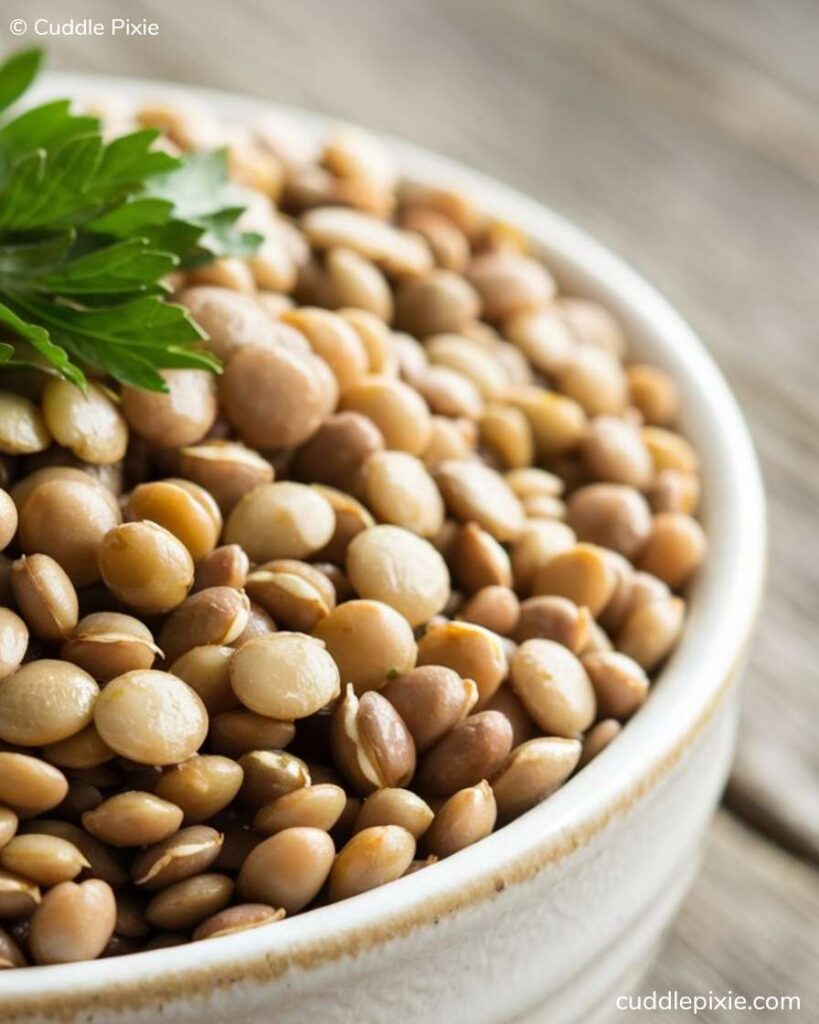
Lentils are an iron-rich legume, offering about 3.3 mg of iron per half-cup. They’re also a good source of fiber, which helps support healthy digestion.
“Lentils are a great option for babies with iron deficiency. Their high iron content and fiber make them an excellent addition to a balanced diet.” — Dr. Jason Lee, Pediatrician
Serving Idea: Puree cooked lentils with a vitamin C-rich food like tomatoes or carrots to enhance iron absorption. You can also serve lentil soup to older babies.
2. White Beans
White beans are a fantastic source of plant-based iron, providing about 18% of a baby’s daily iron needs per quarter cup. They’re soft, easy to digest, and can be incorporated into a variety of meals.
Serving Idea: Mash or puree white beans with olive oil and a little garlic for a creamy dip. This can be served with soft vegetables or whole grain crackers as finger food.
3. Spinach
Spinach is rich in non-heme iron but needs a vitamin C partner to maximize absorption. Pairing it with fruits like oranges or tomatoes boosts the bioavailability of iron.
Serving Idea: Blend cooked spinach with banana and strawberries in a smoothie. You can also cook it with garlic and serve it with lemon juice for a vitamin C boost.
4. Tofu
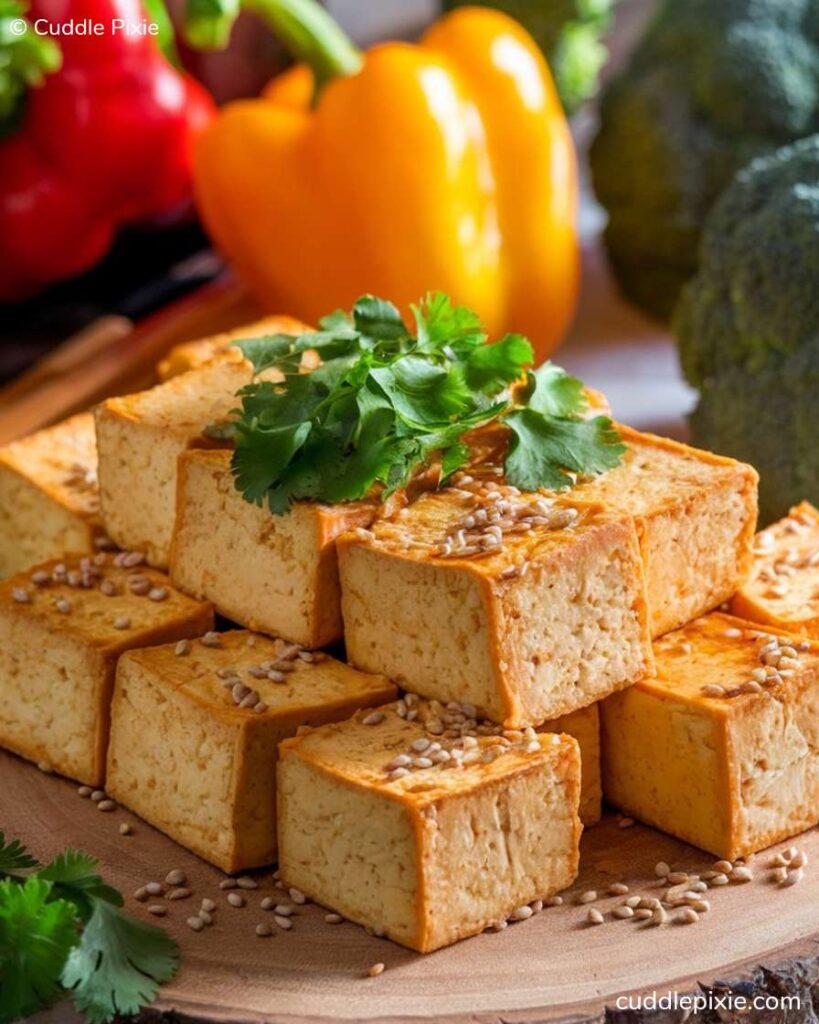
Tofu is an iron-rich plant-based food that offers about 3 mg of iron per half-cup. Its mild flavor and soft texture make it ideal for babies, and it can easily be combined with other iron-rich foods.
“Tofu is an excellent source of non-heme iron. To boost absorption, pair it with vitamin C-rich foods like red bell peppers or citrus fruits.” — Dr. Jennifer Chen, Nutritionist
Serving Idea: Blend tofu with steamed vegetables like broccoli or bell peppers, and serve it as a soft puree for younger babies or finger food for toddlers.
6. Chickpeas
Chickpeas are rich in iron and provide about 2.4 mg per half-cup. They can be mashed, pureed, or even made into baby-friendly hummus, making them a versatile food for iron-deficient babies.
Serving Idea: Mash cooked chickpeas with a little olive oil and lemon juice for a simple hummus. For older babies, serve whole chickpeas as a finger food.
7. Pumpkin Seeds
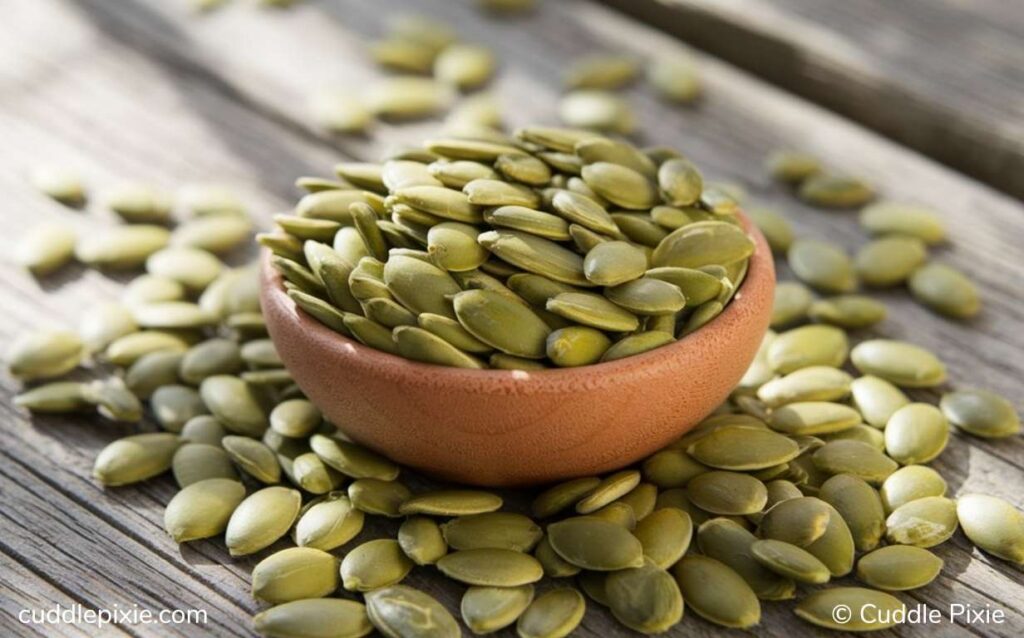
Pumpkin seeds are small but mighty when it comes to iron. They can be ground into a powder and added to your baby’s meals for an extra iron boost.
Serving Idea: Add ground pumpkin seeds to oatmeal or sprinkle them into smoothies for a nutritious iron boost.
8. Black Beans
Black beans are rich in iron, offering about 1.8 mg per half-cup. They’re soft, easy to mash, and pair well with other baby-friendly foods like sweet potatoes or avocados.
Serving Idea: Serve mashed black beans with avocado for a creamy, nutrient-dense meal. You can also mix them into quinoa or serve as a finger food for toddlers.
9. Fortified Cereals
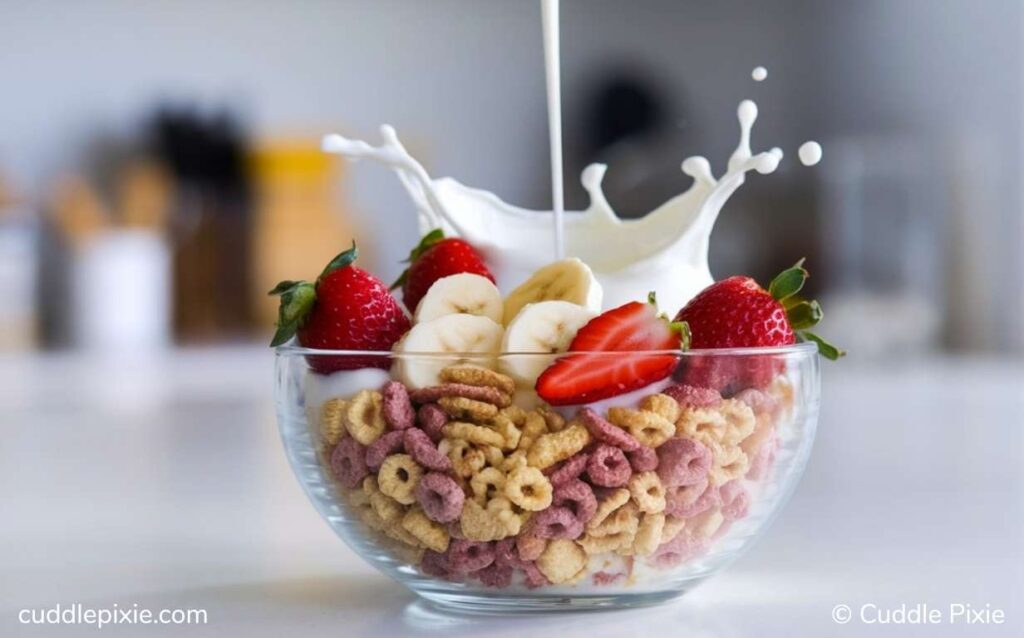
Iron-fortified cereals are one of the easiest and most effective ways to ensure your baby gets enough iron. Many cereals provide up to 60% of a baby’s daily iron requirement per serving.
Serving Idea: Mix iron-fortified cereal with breast milk or formula for younger babies. For older babies, blend the cereal with mashed fruits like apples or pears.
How to Boost Iron Absorption in Babies
Iron absorption can be tricky, especially when relying on plant-based sources of iron. Fortunately, there are ways to enhance how well your baby absorbs iron from food.
1. Pair Iron-Rich Foods With Vitamin C
Vitamin C helps improve the absorption of non-heme iron. Pairing foods like lentils, spinach, or quinoa with vitamin C-rich fruits and vegetables can increase iron uptake significantly.
Example Meals:
- Serve lentils with tomato puree or roasted bell peppers.
- Blend iron-fortified cereal with mashed oranges or strawberries.
- Add lemon juice to spinach or chickpeas.
2. Avoid Calcium-Rich Foods During Iron-Rich Meals
Calcium inhibits iron absorption, so try to avoid offering dairy products like yogurt or cheese alongside iron-rich meals. Offer dairy as a snack between meals instead.
3. Cook With Cast Iron Pans
Cooking in cast iron pans can increase the iron content of your baby’s food, especially when preparing acidic foods like tomatoes or citrus-based dishes.
Iron-Rich Recipes for Babies
Here are a few simple recipes to help you incorporate more iron-rich foods into your baby’s diet.
1. Lentil and Spinach Puree
- Ingredients: ½ cup cooked lentils, 1 cup spinach, 1 tsp lemon juice.
- Directions: Blend the cooked lentils and spinach with a little water or broth. Add the lemon juice for a vitamin C boost. Serve warm.
2. Beef and Sweet Potato Mash
- Ingredients: 2 oz cooked beef, 1 small sweet potato, a dash of cinnamon.
- Directions: Cook the sweet potato until tender. Blend it with the cooked beef and a pinch of cinnamon. Add water or broth to adjust the consistency.
Conclusion
Iron is vital for your baby’s growth and development, and ensuring they get enough of this essential nutrient can prevent iron deficiency and related health issues. By incorporating a variety of iron-rich foods—both animal-based and plant-based—into your baby’s diet, you can keep their iron levels healthy and support their overall well-being.
Remember to pair non-heme iron foods with vitamin C to enhance absorption, and consult your pediatrician if you have any concerns about your baby’s iron intake.
By following these tips and including the foods listed in this guide, you’ll be well on your way to keeping your baby strong, healthy, and thriving.
Frequently Asked Questions (FAQ)
What are the signs of iron deficiency in babies?
Common signs of iron deficiency include pale skin, fatigue, irritability, slow weight gain, and frequent infections. If you notice any of these symptoms, consult your pediatrician.
When should I consider giving my baby iron supplements?
Iron supplements should only be given if prescribed by a pediatrician, especially after confirming iron deficiency through blood tests. It’s always better to rely on a balanced diet first.
Can my baby get too much iron?
Yes, too much iron can cause constipation and other digestive issues. It’s important to follow your pediatrician’s guidance regarding your baby’s iron intake.
